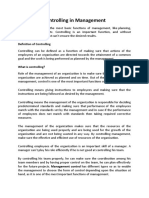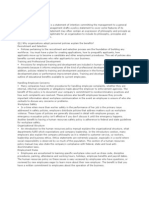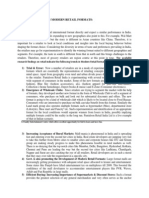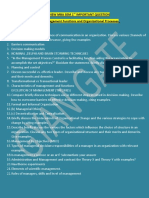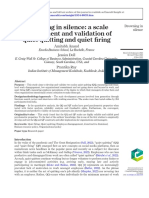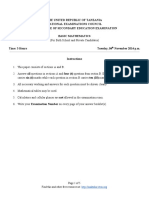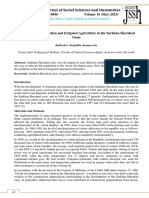Decentralisation: Meaning, Advantages and Disadvantages of
Decentralisation!
Meaning:
Decentralisation can be viewed as an extension of delegation.
When a part of the work is entrusted to others, it is known as delegation.
Decentralisation extends to the lowest level of the organisation.
A few definitions are given below:
1. Decentralisation refers to tire systematic effort to delegate to the
lowest levels all authority except that which can only be exercised at
central points. Louis A. Allen
2. Decentralisation means the division of a group of functions and
activities into relatively autonomous units with overall authority and
responsibility for their operation delegate to timd of cacti unit.Earl. P.
Strong
3. Decentralisation is simply a matter of dividing up the managerial
work and assigning specific duties to the various executive skills.
Newman, summer and Wairen
Thus, decentralisation is concerned with the decentralisation of decisionmaking authority to the lower levels in managerial hierarchy.
Degree of Decentralisation:
The degree of decentralisation is determined by:
(a) Nature of the authority delegated,
�(b) How far down in the organisation it is delegated,
(c) How consistently it is delegated.
So, the degree of decentralisation is determined by the authority given.
For example, manager A in a company is given the authority to buy
certain material worth Rs. 1500 whereas manager B is allowed to do
similar type of work to the extent of Rs. 4500.
It is clear that the degree of decentralisation is less in case of A.
Similarly decisions about the matters referred, measure the degree of
decentralisation depending upon the power to take decisions vested in an
officer without the need of getting consent of somebody else.
Advantages of Decentralisation:
1. Reduces the burden on top executives:
Decentralisation relieves the top executives of the burden of performing
various functions. Centralisation of authority puts the whole
responsibility on the shoulders of an executive and his immediate group.
This reduces the time at the disposal of top executives who should
concentrate on other important managerial functions. So, the only way to
lessen their burden is to decentralise the decision-making power to the
subordinates.
2. Facilitates diversification:
Under decentralization, the diversification of products, activites and
markets etc., is facilitated. A centralised enterprise with the
concentration of authority at the top will find it difficult and complex to
�diversify its activities and start the additional lines of manufacture or
distribution.
3. To provide product and market emphasis:
A product loses its market when new products appear in the market on
account of innovations or changes in the customers demand. In such
cases authority is decentralised to the regional units to render instant
service taking into account the price, quality, delivery, novelty, etc.
4. Executive Development:
When the authority is decentralised, executives in the organisation will
get the opportunity to develop their talents by taking initiative which
will also make them ready for managerial positions. The growth of the
company greatly depends on the talented executives.
5. It promotes motivation:
To quote Louis A. Allen, Decentralisation stimulates the formation of
small cohesive groups. Since local managers are given a large degree of
authority and local autonomy, they tend to weld their people into closely
knit integrated groups. This improves the morale of employees as they
get involved in decision-making process.
6. Better control and supervision:
Decentralisation ensures better control and supervision as the
subordinates at the lowest levels will have the authority to make
independent decisions. As a result they have thorough knowledge of
every assignment under their control and are in a position to make
amendments and take corrective action.
7. Quick Decision-Making:
�Decentralisation brings decision making process closer to the scene of
action. This leads to quicker decision-making of lower level since
decisions do not have to be referred up through the hierarchy.
Disadvantages of Decentralisation:
Decentralisation can be extremely beneficial. But it can be dangerous
unless it is carefully constructed and constantly monitored for the good
of the company as a whole.
Some disadvantages of decentralisation are:
1. Uniform policies not Followed:
Under decentralisation, it is not possible* to follow uniform policies and
standardised procedures. Each manager will work and frame policies
according to his talent.
2. Problem of Co-Ordination:
Decentralisation of authority creates problems of co-ordination as
authority lies dispersed widely throughout the organisation.
3. More Financial Burden:
Decentralisation requires the employment of trained personnel to accept
authority, it involves more financial burden and a small enterprise cannot
afford to appoint experts in various fields.
4. Require Qualified Personnel:
Decentralisation becomes useless when there are no qualified and
competent personnel.
5. Conflict:
�Decentralisation puts more pressure on divisional heads to realize profits
at any cost. Often in meeting their new profit plans, bring conflicts
among managers.
Centralization in any business organization is the spotlight of preeminence and control which lies in the hands of very few people.
Implementation of this abstract notion will bring out both positives and
negatives, just like in any concept. Lets look at the various advantages
and disadvantages of implementing the idea of centralization within an
organization.
Advantages of centralization:
Unbiased allocation of work: Being fair and just in assigning a
particular amount of work, not only between different units but also
between responsible individual employees will increase momentum
within the Company.
Standardization of work: By implementing centralization, one of
the outcomes would result in equality of behavior that guarantees
unvarying judgment and standardized progression.
Area of specialization: There is an immediate advantage if a
leader who handles a particular area is an expert in the same field. This
will ease the work distribution process within the other levels of the
team.
Replication of work: Centralized training and standardization of
work leave no scope for replication of tasks or actions. This eliminates
additional expenditure on excessive labor for duplication of work.
Flexibility: In a crisis or an emergency, standardization of work
takes just one step to revise all the activities at once. This guarantees a
greater degree of flexibility in an organization than a Company with no
centralized training.
� Disadvantages Of Centralization
The following are the main drawbacks or disadvantages of
centralization:
1. Centralization Is Unsuitable For Large Organization
Centralization is impractical in large business organization having
various branches in different locations. It is difficult to
communicate managerial decisions to different operating levels in
the management hierarchy. Top level managers cannot effectively
supervise and control all the activities of the organization.
2. Manager Is Overburdened
In centralization, top managers are over burdened with authority
and responsibility while managing each and every activity of the
organization. He/she cannot devote sufficient time in other major
issues. It tends to decrease working efficiency of the organization.
3. Possibility Of Power Misuse
Centralization of authority at the top level may result in underutilization of power. Top level managers may exercise their powers
on the basis of their personal judgement. This may lead to misuse
of authority if the managers lack proper skills and ability.
4. Low Morale Motivation
In centralization. middle and lower level managers feel
uncomfortable while performing the assigned task. They do not
have the required authority to deal with problems effectively. They
do not get any opportunity to show and develop their personality.
The lack of motivation tends to affect the morale of subordinates.
5. Lack Of Environmental Adaptation
� Business environment is dynamic and therefore, it changes
according to time. In business, it is essential to take quick
decisions to resolve problems of concerned departments or
branches. Centralization is not applicable in dynamic environment
as flexibility will not come promptly from the top level.
6. Inappropriate For Routine Decisions
In centralization, top level managers devote maximum time in
taking routine decisions. Therefore, they cannot devote more time
in non-programmed decisions. This will have a negative impact on
the long term performance of the organization.


